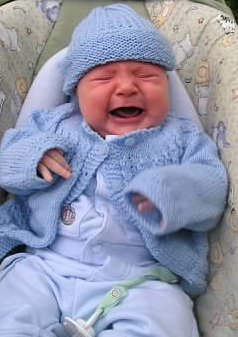Parents: The original baby monitors
Saturday morning my spouse and I had a kid-free (!) picnic breakfast at a lake near our house. We sat about 10 feet away from a pair of geese with their new goslings, just watching. For a while, the adult geese kept a close eye on us – but when we didn’t make any sounds or sudden movements, they went about their business of pecking at their food in the grass.
I’m always fascinated by watching how other species interact with their young. These geese had Spidey sense for sure. They heard sounds long before we did, be it the red-winged blackbird leaving its nest, a hawk flying overhead, or just a guy walking his dog. With one small grunt, they alerted their babies of impending danger and every one of them scuttled to safety in a straight line.
As a mom, I often feel like those geese, exhausting all my senses trying to steer my kids away from all potential dangers. When they were babies, my spouse (who was particularly nervous about SIDS having lost a brother at three months) ordered what was then (a decade ago) much more rare – a baby monitor that senses movements in the crib (aka breathing) and alerts parents when more than 30 seconds go by without a movement.
Did this monitor stop me from opening the nursery door to listen to my sleeping infant? Not a chance. It also gave us a few terrifying nights when the baby had rolled to the edge of the crib and, though she was still breathing, the monitor couldn’t pick up the movements.
New smart baby technologies may breed more anxiety
Recently, I was at a conference about data and healthcare. All the techies and younger parents were excited to hear about the latest baby monitors that alert parents to babies’ needs (i.e., the baby is awake, has rolled over, or requires a diaper change) and also track data like heart rate, oxygen levels, the number of wet diapers, feedings per day, etc. There are even diapers that tell you if your baby has a urinary tract infection. If you’re lucky enough to speak Portuguese, your baby’s diaper will Tweet you when it’s wet.
So, 21st century parents can use their smart phones and wifi connections to monitor and track their babies’ inputs and outputs. Is all this information helpful? Just because we can track this data – should we? Does having more information really relieve our anxieties? Or does it reinforce our worries, stripping away our sense of parenting efficacy?
If your child has special needs, discuss your concerns with her pediatrician and ask about what technologies might be helpful. If you’re the type of mom who checks on her sleeping children multiple times before turning in for the night, chances are, you’ll be even more glued to your smartphone, but instead of waiting for a message from a friend or checking Facebook, you’ll be waiting for your baby to take her next breath. And the one after that. All this smart baby technology can increase parental anxiety, which can actually have a negative effect on kids.
No amount of technology can protect our kids from life. Nor can parenting. Life happens. We can prepare our kids for it: by teaching them to trust us by caring for their needs, by reading to them (don’t even get me started on pajamas that read to your kids). We can try to keep them safe by putting them to sleep on their backs, removing blankets and stuffed animals from cribs, baby “proofing” when they get mobile, and teaching them to be street-wise. But, if we monitor them like crazy, we’re not doing anyone any favors.
Take the money you’d spend on these smart baby technologies and start a college fund. Some day, your baby will be smart all by herself – no sensors attached.

